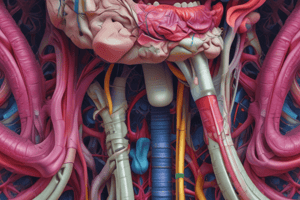Podcast
Questions and Answers
What does the vocal system refer to?
What does the vocal system refer to?
- The larynx
- The upper part of the human respiratory system (correct)
- The diaphragm
- The trachea
What is the function of the larynx?
What is the function of the larynx?
Helps with breathing and sound creation, manipulating pitch and volume.
The trachea is also known as the windpipe.
The trachea is also known as the windpipe.
True (A)
What are vocal cords?
What are vocal cords?
Where are the lungs located?
Where are the lungs located?
The 7 points of good posture include feet shoulder width apart, knees unlocked, arms by your side, spine straight, shoulders back, head up, and _____ on director.
The 7 points of good posture include feet shoulder width apart, knees unlocked, arms by your side, spine straight, shoulders back, head up, and _____ on director.
What is the epiglottis?
What is the epiglottis?
What does the soft palate refer to?
What does the soft palate refer to?
Which of the following is NOT a breathing technique?
Which of the following is NOT a breathing technique?
What is phonation?
What is phonation?
Articulation forms speech sounds.
Articulation forms speech sounds.
To care for your voice, you should warm up, drink plenty of water, get enough sleep, and avoid ______.
To care for your voice, you should warm up, drink plenty of water, get enough sleep, and avoid ______.
Match the vocal anatomy terms with their descriptions:
Match the vocal anatomy terms with their descriptions:
Flashcards
Vocal System
Vocal System
Part of the respiratory system for speaking, singing, and breathing.
Larynx
Larynx
Also known as the voice box; manipulates pitch and volume.
Trachea
Trachea
Also known as the windpipe; delivers air to the lungs.
Vocal Cords
Vocal Cords
Signup and view all the flashcards
Diaphragm
Diaphragm
Signup and view all the flashcards
Lungs
Lungs
Signup and view all the flashcards
Epiglottis
Epiglottis
Signup and view all the flashcards
Hard Palate
Hard Palate
Signup and view all the flashcards
Soft Palate
Soft Palate
Signup and view all the flashcards
Tongue
Tongue
Signup and view all the flashcards
Esophagus
Esophagus
Signup and view all the flashcards
Vocal Folds
Vocal Folds
Signup and view all the flashcards
Phonation
Phonation
Signup and view all the flashcards
Study Notes
Vocal System Overview
- The vocal system is part of the upper human respiratory system, primarily functioning for speaking, singing, and breathing.
Larynx
- Known as the voice box, the larynx plays a crucial role in breathing and sound production, allowing manipulation of pitch and volume.
Trachea
- Commonly referred to as the windpipe, the trachea delivers air to the lungs and remains open almost continuously for airflow.
Vocal Cords
- Comprised of twin membranes that stretch horizontally across the larynx, vocal cords open during inhalation, close while holding breath, and vibrate during speech.
Diaphragm
- Positioned beneath the lungs, the diaphragm is essential for proper breathing techniques and regulates airflow.
Lungs
- Situated in the chest cavity behind the ribs, the lungs are integral to the upper respiratory system and facilitate the process of breathing.
Good Posture for Vocal Performance
- Stand with feet shoulder-width apart, knees unlocked, arms relaxed by your side, spine straight, shoulders back, head held high, and eyes focused on the director.
Epiglottis
- A cartilage structure that prevents food from entering the trachea during swallowing, ensuring safe passage of food to the esophagus.
Palates
- The hard palate is the bony anterior portion of the roof of the mouth, while the soft palate is the posterior, flexible part of the roof.
Tongue
- The most versatile muscle in the body, the tongue occupies a significant portion of the vocal tract and aids in articulation and phonation.
Esophagus
- The esophagus is a muscular tube that conveys food from the pharynx to the stomach, remaining closed except during swallowing or vomiting.
Vocal Folds
- Located in the larynx, vocal folds are crucial for speech and singing, positioned at the junction of the trachea and esophagus.
Breathing Techniques
- Employ deep breathing from the lower lungs, minimizing shoulder movement, and maintaining a relaxed posture. Inhale and exhale through the nose and mouth, imagining a rubber ring around the waist pushed outward during breaths.
Phonation
- Phonation refers to generating sound using the laryngeal system, essential for vocalization.
Articulation
- Articulation involves the formation of speech sounds, critical for clear communication.
Voice Care
- Practices for maintaining vocal health include warming up, staying hydrated, getting sufficient rest, avoiding smoking and caffeine, dietary awareness, treating allergies, and resting when fatigued or ill.
Studying That Suits You
Use AI to generate personalized quizzes and flashcards to suit your learning preferences.





